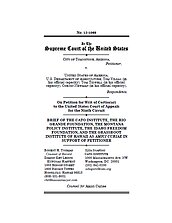City of Tombstone v. United States
Learn more about Cato’s Amicus Briefs Program.
Tombstone, Arizona is sitting on a tinderbox waiting to ignite because the federal government is blocking plans to restore the town’s critical water infrastructure. Water lines have long connected this desert town with springheads and reservoirs located on federally owned land, but a 2011 forest fire, followed by monsoon rains, led to massive mudslides and rock falls that shut off the city’s source of water. Arizona declared a state of emergency and jump-started municipal efforts to regain access to the community’s lifeblood. Despite this precarious situation, the U.S. Forest Service has stonewalled the city, preventing workers from using mechanized equipment to reconstruct the water system. The lower courts having denied it relief, Tombstone (represented by the Goldwater Institute) is now seeking Supreme Court review. Cato has joined a coalition of Western-state public policy foundations — the Rio Grande Foundation, Montana Policy Institute, Idaho Freedom Foundation, and Grassroot Institute of Hawaii — to file an amicus brief that urges the Court to consider the serious questions raised when the federal government uses its vast land holdings to prevent states or their political subdivisions from exercising essential functions reserved to them under the Tenth Amendment. While the Property Clause grants Congress the power to make rules and regulations for federally owned land, this authority, like every enumerated federal power, is limited by our fundamental principles of federalism. In the 1987 case of California Coastal Community v. Granite Rock Company, the Supreme Court allowed a state to regulate private uses of federal land to further environmental goals. If anything, Tombstone’s interests here are even stronger: restoring its municipal water supply, responding to emergencies, and protecting the life, safety, and property of its residents. Indeed, state sovereignty means very little if a federal agency can place a municipality’s existence under such great jeopardy. The Court should grant review because Tombstone’s ability to access federal land to repair its water infrastructure is a traditional government function reserved to the states and should not be trumped by federal authority under the Property Clause.

